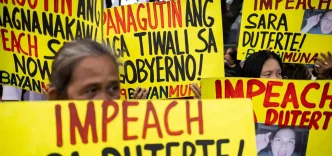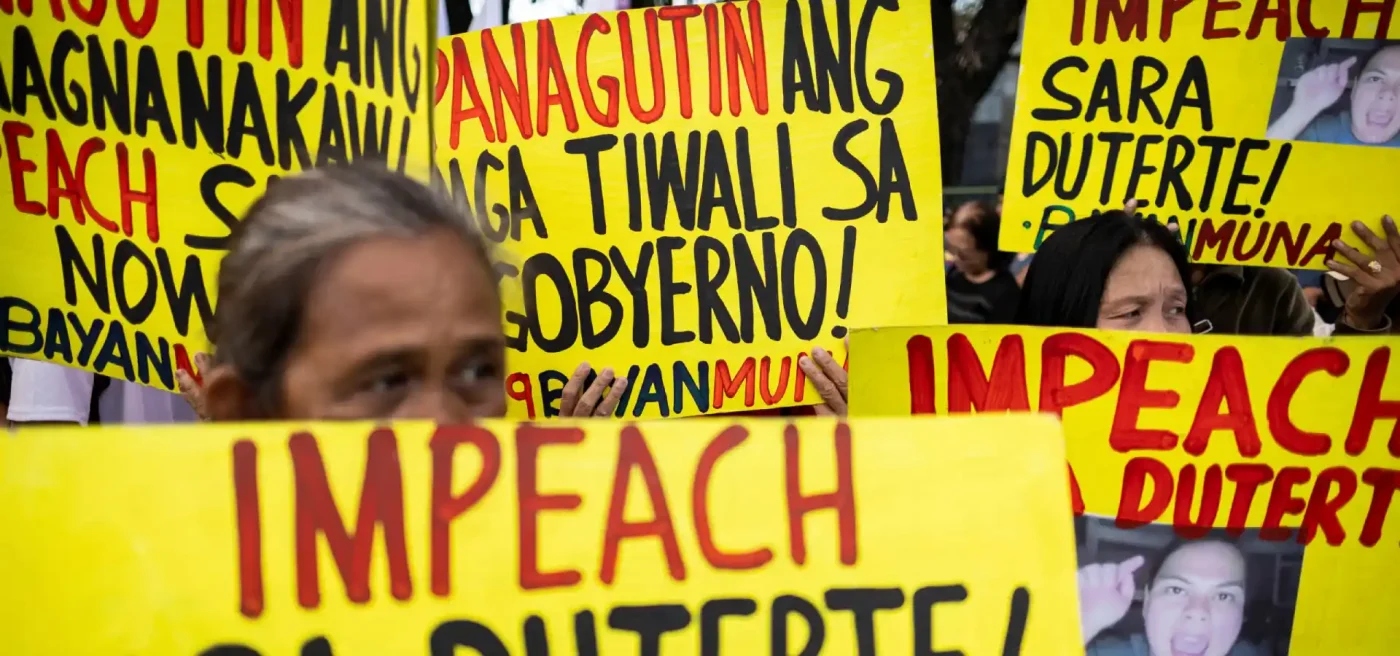In a historic and seismic shift in Philippine politics, Vice President Sara Duterte faces an impeachment trial that could redefine accountability and power dynamics at the highest levels of government. On February 5, 2025, the House of Representatives voted overwhelmingly to impeach Duterte, marking the first time a sitting vice president has been pushed to the brink of removal since the post-Edsa People Power era. With 215 members supporting the move—far exceeding the constitutional threshold of 102—this unprecedented action has sent shockwaves through the nation’s political establishment.
The impeachment, now headed to the Senate for trial, centers on allegations of “high crimes,” including corruption tied to the rapid expenditure of confidential funds and politically charged claims of involvement in an alleged assassination plot against President Ferdinand Marcos Jr., her former ally. As the country braces for a legal and political showdown, the proceedings are set to test the resilience of democratic institutions and the fragile alliances that have long shaped governance in the Philippines.
Roots of a Political Crisis
The origins of this crisis lie in the unraveling of a once-formidable political partnership. Sara Duterte, daughter of former President Rodrigo Duterte, campaigned alongside Marcos in the 2022 elections, securing a landslide victory under the banner of unity. However, tensions emerged soon after their inauguration, fueled by policy disagreements, personal rivalries, and diverging political ambitions. The alliance’s collapse became starkly evident as accusations against Duterte mounted, culminating in the impeachment complaint filed by a broad coalition of lawmakers.
Central to the charges is Duterte’s handling of P125 million (US$2.2 million) in confidential and intelligence funds (CIFs), which were disbursed within just 11 days of her assuming office in 2022. Lawmakers argue that this expenditure violated fiscal transparency and accountability protocols, breaching budgetary laws and procurement rules. Legal scholars have pointed to these actions as potential grounds for impeachment under the 1987 Constitution, which holds public officials accountable for “culpable violation” of the charter and betrayal of public trust.
More explosively, the complaint includes allegations of Duterte’s involvement in a supposed plot to assassinate President Marcos. While specifics remain murky and unverified, the accusation has heightened the drama surrounding the impeachment, turning it into a public spectacle that transcends legal proceedings. Observers caution that such claims, if unsubstantiated, risk undermining the credibility of the process, though they underscore the deep mistrust between the nation’s top leaders.
A Senate Trial with High Stakes
The Senate, tasked with serving as the impeachment court, is scheduled to convene on June 3, 2025, for preliminary proceedings, with formal hearings expected to begin in late July. Senate President Francis Escudero confirmed the timeline in a letter to House Speaker Martin Romualdez, signaling that the trial will move forward with urgency. Seven charges from the Articles of Impeachment will be read in open session, setting the stage for a battle that could reshape the country’s political landscape.
Under the Constitution, a conviction requires a two-thirds majority—or 16 votes—in the 24-member Senate. Duterte, in turn, needs at least nine votes for acquittal to remain in office. A guilty verdict would result in her immediate removal from the vice presidency and a permanent ban from holding public office. In such a scenario, President Marcos would nominate a replacement from Congress, subject to confirmation by a majority vote in both the Senate and the House of Representatives, as stipulated in Section 9, Article VII of the 1987 Constitution.
The recent midterm elections in May 2025 have added another layer of complexity to the trial’s dynamics. Political analysts note that the results slightly favored Duterte, with one of her allies securing an unexpected Senate seat while Marcos’ slate underperformed. In the House, 100 of the 115 lawmakers who initially signed the impeachment complaint and sought reelection retained their seats—a striking 86.9 percent success rate. Assistant Majority Leader Jude Acidre described this as a public mandate for accountability, suggesting that the electorate broadly supports the push to hold Duterte to answer for the allegations.
Defiance Amid Accusations
Duterte has vehemently rejected the impeachment as a politically motivated attack, framing it as an attempt to undermine her family’s influence. In a widely criticized statement, she declared her desire for a “bloodbath” during the trial, a remark that drew sharp rebuke for its inflammatory tone. While she has avoided directly addressing the specific allegations, Duterte insists that all expenditures of confidential funds were lawful and necessary for national security purposes.
Her defense is complicated by the broader context of her family’s legal and political struggles. Her father, former President Rodrigo Duterte, is currently facing trial at the International Criminal Court over human rights violations linked to his controversial drug war. This parallel crisis has intensified scrutiny on the Duterte clan, with critics accusing them of leveraging political power to evade accountability. For Sara Duterte, the impeachment trial represents not just a personal battle but a fight for her family’s legacy in Philippine politics.
Marcos’ Delicate Balancing Act
President Ferdinand Marcos Jr. has sought to distance himself from the impeachment proceedings, emphasizing the Senate’s independent role in adjudicating the case. In a podcast interview following the midterm elections, he stated, “Let’s leave that to the Senate, which has its own processes.” While publicly advocating for reconciliation with the Duterte family, Marcos has been unable to quell the escalating tensions, particularly in light of Rodrigo Duterte’s arrest and the deepening rift between their camps.
The president’s stance reflects a delicate balancing act. On one hand, aligning too closely with the impeachment risks alienating Duterte’s significant base of supporters, particularly in the southern regions where her family wields considerable influence. On the other, failing to address the serious allegations against her could undermine his administration’s commitment to transparency and governance reforms. As the trial unfolds, Marcos’ ability to navigate these competing pressures will be closely watched.
Implications for Democracy and Dynasties
Beyond the immediate fate of Sara Duterte, the impeachment trial carries profound implications for the Philippines’ democratic institutions and the enduring role of political dynasties. The proceedings will serve as a litmus test for the strength of constitutional checks and balances, particularly in a country where personal alliances and family ties have often overshadowed institutional norms. A conviction could signal a shift toward greater accountability for public officials, setting a precedent for future cases of alleged misconduct.
Conversely, an acquittal might reinforce perceptions of impunity among the political elite, further eroding public trust in governance. The trial’s outcome could also reshape the balance of power ahead of the 2028 national elections, influencing whether the Duterte family retains its grip on key constituencies or if Marcos consolidates his own political coalition. For many Filipinos, the stakes extend beyond individual leaders to the broader question of whether the nation’s democracy can withstand the pressures of polarization and vested interests.
Public Sentiment and Polarization
As the Senate prepares to hear the case, public sentiment remains deeply divided. Supporters of Duterte argue that she is a victim of political vendetta, targeted for challenging the status quo and representing marginalized voices from Mindanao. Critics, however, view her as emblematic of entrenched dynastic politics, accusing her of abusing power and public funds with little regard for transparency. Social media platforms, including X, reflect this polarization, with hashtags and posts amplifying both outrage and solidarity.
The high reelection rate of lawmakers who backed the impeachment suggests that a significant portion of the electorate favors holding Duterte accountable. Yet, her enduring popularity in certain regions indicates that the trial’s outcome is far from predetermined. Political observers warn that the proceedings could exacerbate existing divisions, potentially fueling unrest if either side perceives the process as unfair or manipulated.
A Defining Moment for the Philippines
As the impeachment trial of Vice President Sara Duterte looms, the Philippines stands at a crossroads. The legal arguments, Senate votes, and public reactions will collectively shape not only her political future but also the standards of accountability that govern the nation’s leaders. Whether the process strengthens democratic institutions or deepens political fractures remains an open question, one that Filipinos and international observers alike will monitor with keen interest.
For now, the nation watches as a historic constitutional showdown unfolds, its resolution poised to leave an indelible mark on the Philippines’ turbulent political landscape.
















